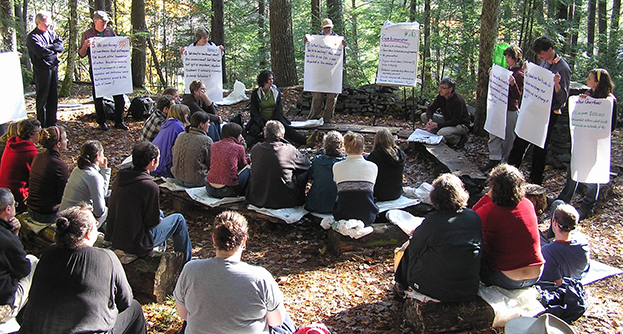In the June 24, 2011 edition of the online publication Philanthropy Journal, Terrie Temkin, a Florida-based consultant, suggests that “the board needs to get out more”. This struck me as being really good advice. The phrase is worth repeating and its meaning explored. In essence boards will be more effective when directors are able themselves to bring some mission-related experience to the board table.
How often is this the case? Not often would be my guess. Boards are often chosen for their fundraising, political connections and/or professional expertise. Knowledge of the field is usually resides with the executive director and staff.
I do not think the idea around getting out more is about the board developing expertise; it is about identifying looming questions about the community and cultivating strategic curiosity about possibilities. Away from the board table the board’s work is about seeing, listening, and understanding. It is not purely a rational or intellectual pursuit. Exploring what is happening in one’s community requires some relaxing of the need to fix on a clear and predetermined destination. It is perhaps just as much about getting out as the quality of particular encounters.
Richard Chait, Bill Ryan and Barbara Taylor, in their 2004 book, Governance as Leadership: Reframing the Work of Nonprofit Boards make the case that boards need to do fiduciary, strategic and generative work. Exploring the world one’s organization operates in is essential if one is to govern strategically and generatively. Fiduciary governance, the stuff of agenda driven business meetings is not enough in the long term. Getting out enables directors and staff have a common experience of “working at the boundary”, essential to strategic and generative thinking.
The techniques that Temkin suggests for doing this are very good ones: they include “by the way talk” and meetings with other boards and external stakeholders. This suggests that governing involves thinking around the board table and thinking away from the table.
Around the board table a director’s talents involve involve sorting existing knowledge, identifying options, deliberating and decision-making. What are the opportunities to be pursued or problems to be solved? Ideally this involves rational analysis, the identification of options, looking at pros and cons. It involves making decisions.
Away from the table the act of governing is less directed, less instrumental, and less urgent for the organization. However, it is more important in the long run.
While clearly the governance work needed by non-profit organizations will change depending on where they are in their development and what their external circumstances may be, some time for more exploratory work should be sought out.
(The above image, although not quite a representation of the meaning of the board getting out more, is one of an Ecology Action Centre board, staff and members gathering at Windhorse Farm, a popular ecological and meditative retreat in Nova Scotia)

